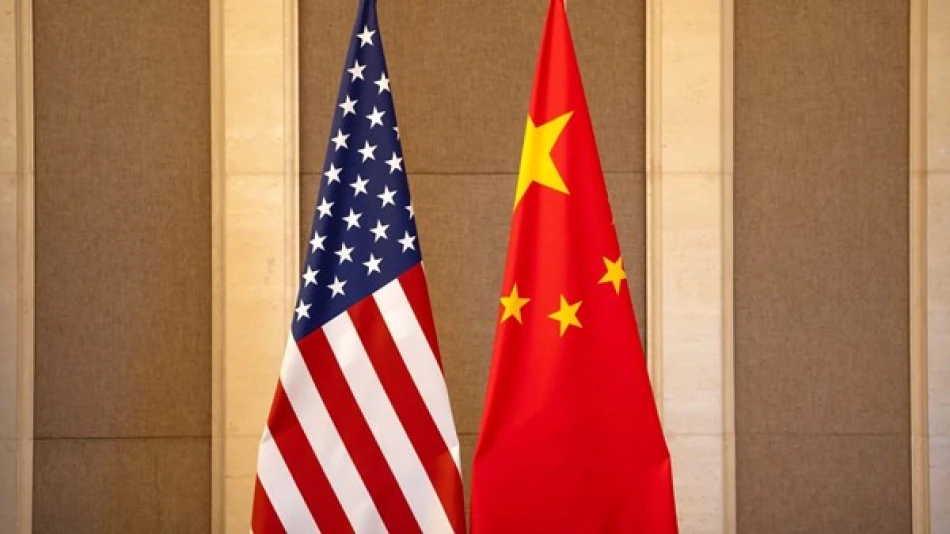
US and China Engage in Fresh Trade Talks Amid Tariff Tensions
US-China Trade Talks Resume in Madrid as TikTok Deadline Looms
Senior US and Chinese officials will convene in Madrid on Sunday for critical trade negotiations that could determine the fate of TikTok's American operations and shape broader economic relations between the world's two largest economies. The talks come just days before a Wednesday deadline requiring TikTok to divest its US assets, adding urgency to discussions that will also address tariffs, rare earth minerals, and anti-money laundering cooperation.
High-Stakes Diplomacy with Multiple Fronts
US Trade Representative Jamison Greer and Treasury Secretary Scott Bessent will lead the American delegation in talks with Chinese Vice Premier He Lifeng and other senior Chinese economic officials. The Madrid meeting represents a continuation of diplomatic efforts that began gaining momentum following their last encounter in Stockholm in July 2024.
The timing is particularly significant, as the Wednesday TikTok divestiture deadline creates immediate pressure for resolution. The Chinese-owned social media platform, used by over 170 million Americans, faces a potential ban unless its parent company ByteDance sells its US operations—a move Beijing has consistently opposed as forced technology transfer.
Building on Stockholm's Fragile Progress
The July Stockholm agreement established a 90-day trade truce that substantially reduced counter-tariffs from both sides and restored the flow of critical rare earth minerals from China to the United States. This breakthrough demonstrated that despite broader geopolitical tensions, both nations recognize the economic necessity of maintaining trade channels.
President Donald Trump's decision to extend current US tariffs on Chinese goods—averaging around 55 percent—until November 10th provides a window for negotiation. However, this extension also maintains significant economic pressure on Chinese exporters, potentially strengthening America's bargaining position.
Rare Earth Minerals: A Strategic Leverage Point
The restoration of rare earth mineral exports represents a crucial victory for US manufacturers, particularly in the defense and technology sectors. China controls approximately 80 percent of global rare earth processing, making American supply chains vulnerable to disruption. The Stockholm agreement's success in reopening these channels suggests both sides understand the mutual benefits of selective cooperation.
Market Implications and Investor Outlook
Financial markets will closely monitor the Madrid talks for signals about broader US-China economic relations. The technology sector, in particular, faces significant uncertainty as the TikTok case could set precedents for other Chinese-owned platforms and applications operating in the US market.
Currency markets have already shown sensitivity to US-China trade developments, with the yuan strengthening slightly ahead of the talks. However, the 55 percent tariff level maintains substantial pressure on Chinese exporters, creating incentives for Beijing to seek meaningful concessions.
Anti-Money Laundering: An Unexpected Cooperation Area
The inclusion of anti-money laundering cooperation in the agenda signals both nations' recognition that financial crime transcends bilateral tensions. This collaboration could provide a foundation for broader regulatory cooperation, particularly as both countries grapple with cryptocurrency-related illicit activities and sanctions evasion.
Comparing Global Approaches
The US approach contrasts sharply with other major economies' handling of Chinese technology companies. While the European Union has implemented data protection requirements, it has not pursued forced divestiture. Similarly, countries like Singapore and the UAE have welcomed Chinese technology investments as part of their digital economy strategies.
The Path Forward
Success in Madrid would require China to offer meaningful concessions on market access and intellectual property protection while the US demonstrates flexibility on implementation timelines and scope. The TikTok deadline creates immediate urgency, but the broader trade relationship requires sustained engagement beyond any single issue.
The talks represent a test of whether economic pragmatism can overcome geopolitical rivalry. With both economies facing domestic pressures and global uncertainty, the Madrid discussions could determine whether the world's most important bilateral trade relationship moves toward cooperation or further fragmentation.
Most Viewed News

 Layla Al Mansoori
Layla Al Mansoori






